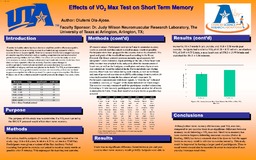
ATTENTION: The works hosted here are being migrated to a new repository that will consolidate resources, improve discoverability, and better show UTA's research impact on the global community. We will update authors as the migration progresses. Please see MavMatrix for more information.
Show simple item record
| dc.contributor.author | Ola-Ajose, Olufemi | en_US |
| dc.date.accessioned | 2011-07-15T16:29:08Z | en_US |
| dc.date.available | 2011-07-15T16:29:08Z | en_US |
| dc.date.copyright | 2011-05 | en_US |
| dc.identifier.uri | http://hdl.handle.net/10106/5890 | en_US |
| dc.description.abstract | Exercise in healthy adults has been shown to small but positive effects on cognitive function. Short term or working memory is a limited storage system in which a memory is lost or decays rapidly. Short term memory is believed to support an array of complex cognitive behaviors such as reading comprehension and mathematical problem solving (Beilock & Carr, 2005). The effects of exercise intensity on short term memory is varied, although submaximal and moderate exercise bouts have been shown to have a positive effect on memory. Exercise causes changes in cardiorespiratory, hormonal and metabolic processes that may increase the availability of oxygen, nutrients and glucose to the brain. The VO2 max test measures aerobic power. Every graded exercise test does not necessarily yield a true maximal oxygen consumption but will always result in a peak oxygen consumption. The Bruce Protocol, one of the earliest standard treadmill protocols developed, was used. | en_US |
| dc.description.sponsorship | Wilson, Judy Ph.D. | en_US |
| dc.language.iso | en_US | en_US |
| dc.subject.other | Maximal oxygen consumption | en_US |
| dc.subject.other | Memory recall | en_US |
| dc.subject.other | Short-term memory | en_US |
| dc.title | Effects of VO2 Max Test on Short Term Memory | en_US |
| dc.type | Presentation | en_US |
| dc.publisher.department | Neuromuscular Research Laboratory, The University of Texas at Arlington. | en_US |
| dc.publisher.department | Department of Kinesiology, The University of Texas at Arlington. | en_US |
| dc.publisher.department | Exercise Research Laboratories, The University of Texas at Arlington. | en_US |
Files in this item
- Name:
- Ola Ajose.pdf
- Size:
- 633.1Kb
- Format:
- PDF
This item appears in the following Collection(s)
Show simple item record


